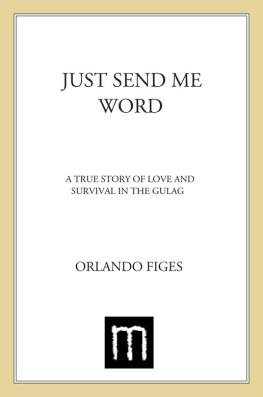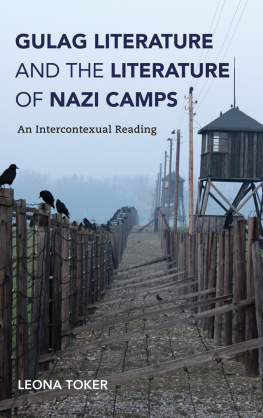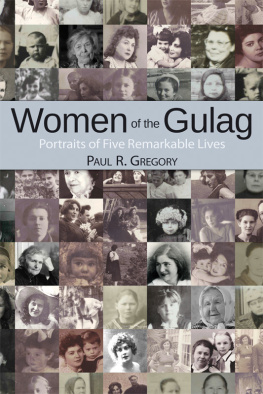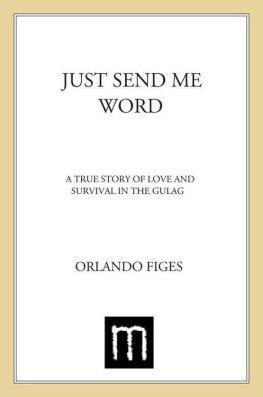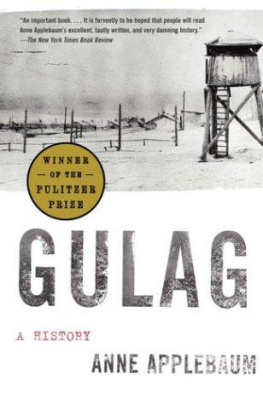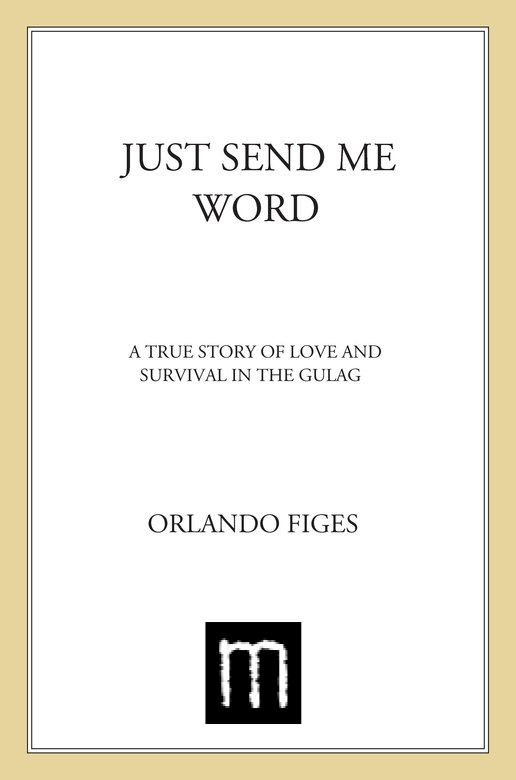This book really belongs to the Mishchenkos. It is their story, and without their help it could not have been written. Lev Glebovich and Svetlana Aleksandrovna were supportive from the start of this project. I am only sorry that they did not live to see its fruition, but hope their family will accept this book as a token of my debt of gratitude to them. Nikita Lvovich read the drafts in Russian, added valuable insights and commentaries, and made criticisms with touching gentleness and tact. I am also grateful to his children, Ilia, Lida and Vera Mishchenko, all three rightly proud of their grandparents.
In terms of the research and writing of this book my greatest debt is to Irina Ostrovskaya, Senior Researcher at Memorial, who knew and worked with Lev Glebovich and Svetlana Aleksandrovna for many years before the discovery of their letters. Irina persuaded them to give me access to their archive, conducted most of the filmed interviews, supervised the transcription of the letters, provided biographical notes, answered endless queries and read my drafts in Russian, correcting my mistakes with tireless patience and challenging my views on many things.
At Memorial in Moscow I would also like to thank Alyona Kozlova, Elena Zhemkova and the members of the academic council, who read sections of the draft.
In Pechora I would like to thank Tatiana Afanaseva, the director of Memorial, who gave up a great deal of her time to help my research, and Boris Ivanov, who provided invaluable information about the town and wood-combine. Special thanks are owed to him for his extraordinary drawing of the convoy outside the 1st Colony.
In Syktykvar I would like to say a special thanks to Anton Niskovsky, a researcher in the Peoples Archive of the Republic of Komi,who helped me find, among many other valuable documents, the Gulag files of the wood-combine and the Pechora labour camp.
I owe a debt of gratitude to the BBC for two visits to Moscow: the first with Mark Burman, the radio producer, who was with me when we discovered the trunks at Memorial; the second with Ben Lewis and Paul Cox to film the interviews. I would like to thank Nick Fraser for investing in the project, and Ben Lewis for his efforts to raise interest in a documentary film. Thanks are also due to the UK Film Council for financing the copying of the dvds for the Mishchenkos and Memorial. I am particularly grateful to Tanya Seghatchian, whose support has helped me far more than she knows.
The Leverhulme Trust financed the transcription of the letters by Memorial. I am grateful to the Trust for its generous support.
Special thanks are also due to my friend Emmanuel Roman, who has been a keen supporter of this project and helped to finance it.
With the translation of the letters into English I was helped by Nicky Brown, who did the groundwork for my own translations of the letters in this book. I am very grateful to Nicky, a talented translator, who gave some precious insights into the letters. I am also grateful to Polina Haynes, who translated my draft chapters into Russian (so that they could then be checked by the Mishchenkos and Memorial) with tremendous care to detail and efficiency.
I would like to thank David Khmelnitsky for his gudiance in the world of Soviet physics; Emily Johnson for sharing her research on Gulag letters; Anna Rotkirch for her advice on matters of courtship; and Deborah Kaple for sending me an early copy of her Gulag Boss . Special thanks are also due to Rodric Braithwaite and Hiroaki Kuromiya, who read the draft in its entirety and provided valuable commentary.
I would like to thank my family Stephanie, Eva, Lydia, Alice, Kate and Stoph who read or listened to the early drafts and made helpful suggestions.
As ever, I owe a debt of gratitude to my agent, Deborah Rogers, who always believed in this book, a new departure for my work, andfought hard for me to write it in this form. At RCW Mohsen Shah, Stephen Edwards and Laurence Laluyaux have been fantastic over many years.
At Penguin I would like to thank Simon Winder, my ever supportive editor, Stefan McGrath, Jenny Fry, Marina Kemp, Penelope Vogler and David Watson, the copy-editor; at Metropolitan, the copy-editor Roslyn Schloss. But my greatest editorial debt is to Sara Bershtel at Metropolitan, whose wise guidance and rigorous attention to detail have made this a better book.
London, January 2012
Peasant Russia, Civil War:
The Volga Countryside in Revolution, 19171921
A Peoples Tragedy: The Russian Revolution, 18911924
Interpreting the Russian Revolution:
The Language and Symbols of 1917
(with Boris Kolonitskii)
Natashas Dance:
A Cultural History of Russia
The Whisperers: Private Life in Stalins Russia
The Crimean War: A History
ORLANDO FIGES is the author of The Crimean War , The Whisperers , Natashas Dance , and A Peoples Tragedy , which have been translated into twenty-seven languages. The recipient of the Wolfson History Prize and the Los Angeles Times Book Award, among others, Figes is a professor of history at Birkbeck College, University of London.
In March 2008 I returned to Moscow to meet Lev and Svetlana. I wanted to record some interviews with them and ask them about the letters, which were hard to read and understand, even for a native Russian speaker, and full of details, code words, initials and hidden meanings that only they were able to explain.
I went with Irina Ostrovskaya from Memorial to their apartment on the fourteenth floor of a tower block in Yasenevo, a residential suburb in the south-west corner of Moscow. When we came out of the lift, we were met by Lev Glebovich, small and thin with a gentle weathered face, smartly dressed in a light-blue shirt and grey trousers, who introduced himself in broken English and showed us into the apartment with a natural courtesy. Lev was nimble on his feet for a ninety-one-year-old. As he moved the furniture in the narrow entrance-hall to make room for our equipment, I noticed he was strong. We made ourselves at home in the small kitchen whose windows looked out on the concrete towers and factory smokestacks of Moscow. Bread, sausage, sweets and biscuits had been placed on the Formica table for our visit. Lev told us that his grandson had been sent to buy more bread. He was anxious that we might not have enough a worry I had come across on previous visits to survivors of the camps.
Once we were settled, Lev announced that he would fetch Svetlana Aleksandrovna. I was surprised to hear him use her name and patronymic in this rather formal way. I put it down to his old-fashioned gentlemanly manners, although later I came to understand that it was part of his veneration for the woman who had saved him. Lev soon reappeared with Svetlana in a wheelchair. He manoeuvred it into the kitchen with an ease suggesting years of practice and devotion. Svetlana had been ill for a long time: heartdisease and a series of small strokes had left her unable to walk. Her grey hair and pebble glasses made her appear very old. But once she began to talk, she displayed a liveliness, her playful blue eyes sparkling when she made a joke and smiled.
Svetlana had retired from the institute in 1972, and six years later she and Lev had moved to Yasenevo, at that time a new suburb beyond the reach of the Metro. They lived with their daughter, Anastasia, who suffered chronically from bipolar depression and was unable to work. Their son, Nikita, a medical researcher, later moved with his wife and three children into an apartment in the same building.

